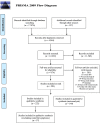The psychological subtype of intimate partner violence and its effect on mental health: a systematic review with meta-analyses
- PMID: 35948921
- PMCID: PMC9364557
- DOI: 10.1186/s13643-022-02025-z
The psychological subtype of intimate partner violence and its effect on mental health: a systematic review with meta-analyses
Abstract
Purpose: The present study examines the association between psychological violence and posttraumatic stress disorder (PTSD), depression, and anxiety, while comparing the specific subtypes of psychological violence and simultaneously focusing on methodological shortcomings.
Method: A systematic review and random-effects meta-analyses were applied on the three main outcomes: PTSD, depression, and anxiety. Four electronic databases were searched (PsycINFO, PubMed, EMBASE, and Web of Science), and a total of 194 studies were included (k = 149 for meta-analyses). GRADEpro was used to evaluate the certainty of the evidence from the meta-analyses.
Results: Psychological violence had strong associations with the three main outcomes, with the strongest association for PTSD in both female and male victims. Coercive control was particularly associated with PTSD for female victims, while emotional/verbal and dominance/isolation had the strongest association with depression. Although the identified studies were characterized by gender bias, psychological violence appear to affect male mental health too.
Discussion: Findings from the meta-analyses support the notion that psychological violence is a traumatic experience, which is strongly association with PTSD and other common mental health problems linked to trauma. GRADEpro rated the certainty of evince to be low, and thus, our confidence in the estimated effect is limited. Gender bias, the applied terminology, and other methodological shortcomings are discussed. Despite the substantial amount of research on this topic, more research is needed before we can draw any final conclusions on the effect of psychological violence on mental health.
© 2022. The Author(s).
Conflict of interest statement
The authors declare that they have no competing interests.
Similar articles
-
The psychological subtype of intimate partner violence and its effect on mental health: protocol for a systematic review and meta-analysis.Syst Rev. 2019 Aug 9;8(1):198. doi: 10.1186/s13643-019-1118-1. Syst Rev. 2019. PMID: 31399073 Free PMC article.
-
Psychological interventions for common mental disorders in women experiencing intimate partner violence in low-income and middle-income countries: a systematic review and meta-analysis.Lancet Psychiatry. 2020 Feb;7(2):173-190. doi: 10.1016/S2215-0366(19)30510-3. Lancet Psychiatry. 2020. PMID: 31981539 Free PMC article.
-
Deployment of personnel to military operations: impact on mental health and social functioning.Campbell Syst Rev. 2018 Jun 1;14(1):1-127. doi: 10.4073/csr.2018.6. eCollection 2018. Campbell Syst Rev. 2018. PMID: 37131363 Free PMC article.
-
Outcomes of trauma-informed care on the psychological health of women experiencing intimate partner violence: A systematic review and meta-analysis.J Psychiatr Ment Health Nurs. 2024 Apr;31(2):203-214. doi: 10.1111/jpm.12976. Epub 2023 Sep 12. J Psychiatr Ment Health Nurs. 2024. PMID: 37697899
-
Interventions for adults with a history of complex traumatic events: the INCiTE mixed-methods systematic review.Health Technol Assess. 2020 Sep;24(43):1-312. doi: 10.3310/hta24430. Health Technol Assess. 2020. PMID: 32924926 Free PMC article.
Cited by
-
Comparative Analysis of Intimate Partner Violence Perpetrators According to their Referral Type: Self-Referred, Legally Mandated, and Formally Pressured.Crim Justice Behav. 2025 Jul;52(7):1067-1087. doi: 10.1177/00938548251333800. Epub 2025 Apr 16. Crim Justice Behav. 2025. PMID: 40416505 Free PMC article.
-
Health status among women and men in Canada who reported experiences of non-physical intimate partner violence, Canada.Prev Med Rep. 2025 Feb 17;51:103011. doi: 10.1016/j.pmedr.2025.103011. eCollection 2025 Mar. Prev Med Rep. 2025. PMID: 40065754 Free PMC article.
-
Association Between Women's Exposure to Intimate Partner Violence and Self-reported Health Outcomes in New Zealand.JAMA Netw Open. 2023 Mar 1;6(3):e231311. doi: 10.1001/jamanetworkopen.2023.1311. JAMA Netw Open. 2023. PMID: 36867408 Free PMC article.
-
Prevalence and risk factors of intimate partner violence during the COVID-19 pandemic: Results from the population-based study DREAMCORONA.PLoS One. 2024 Jun 27;19(6):e0306103. doi: 10.1371/journal.pone.0306103. eCollection 2024. PLoS One. 2024. PMID: 38935801 Free PMC article.
-
Examining the Role of Interpersonal Violence in Racial Disparities in Breastfeeding in North Dakota (ND PRAMS 2017-2019).Int J Environ Res Public Health. 2023 Apr 9;20(8):5445. doi: 10.3390/ijerph20085445. Int J Environ Res Public Health. 2023. PMID: 37107727 Free PMC article.
References
-
- EUAFR . Violence against women, an EU-wide survey: main results. Vienna: European Union Agency for Fundamental Rights. European Union Agency for Fundamental Rights; 2014.
-
- Black MC, Basile KC, Breiding MJ, Smith SG, Walters ML, Merrick MTea. The national intimate partner and sexual violence survey (NISVS): 2010 summary report. Atlanta: National Center for Injury Prevention and Control, Centers for Disease Control and Prevention; 2011.
-
- Golding JM. Intimate partner violence as a risk factor for mental disorders: a meta-analysis. J Fam Viol. 1999;14(2):99–132. doi: 10.1023/A:1022079418229. - DOI
Publication types
MeSH terms
LinkOut - more resources
Full Text Sources
Medical


